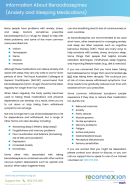You can now add Healthify as a preferred source on Google. Click here to see us when you search Google.
Benzodiazepines
Key points about benzodiazepines
- Benzodiazepines are prescribed to treat many conditions including severe anxiety, sleep problems, alcohol withdrawal symptoms, seizures and muscle spasms.
- When they're used for anxiety and sleep problems it's best to use benzodiazepines for a short time only. Ongoing use is not recommended.
- Read more about them and how to take them safely.

Benzodiazepines are a group of medicines that reduce activity in your brain and central nervous system. They're used to treat a number of conditions, such as:
- severe anxiety, agitation or panic attacks if other treatments aren't working
- severe insomnia (sleeping problems) if other treatments aren't working
- to relax and/or sedate you during certain medical procedures or operations
- to reduce the symptoms of alcohol withdrawal if you have stopped drinking
- muscle spasms – to help relax your muscles
- seizures.
Examples of benzodiazepines available in Aotearoa New Zealand
- Alprazolam
- Clobazam (Frisium®)
- Clonazepam (Paxam®)
- Diazepam
- Lorazepam (Ativan®)
- Midazolam
- Temazepam (Normison®)
- Zopiclone*
* Zopiclone is not a true benzodiazepine but it acts in a similar way to help with sleep problems (insomnia).
Avoid ongoing use of benzodiazepines for anxiety and sleep problems (insomnia)
When used for anxiety and sleep problems it's best to use benzodiazepines for a short time only. Ongoing use is not recommended. Your body gets used to benzodiazepines quickly and after a few weeks it's unlikely they will have the same effect. This doesn't happen if you take benzodiazepines every now and again, or for a few days. If you take a benzodiazepine every day for longer than 2 weeks, you may feel dependent on it. You may get withdrawal effects if you stop suddenly and the feelings of anxiety may be worse.
If you have been using benzodiazepines every day for a long time, your healthcare provider could recommend you reduce your dose gradually when it's time to stop taking it. This is to reduce the risk of withdrawal effects. See more about lowering my dose of benzodiazepines below.
Note: If you're using a benzodiazepine for seizure control, follow the advice of your healthcare provider about ongoing use.
You need to take extra care when taking benzodiazepines because they can cause sleepiness and affect your concentration.
Avoid or limit alcohol
- Avoid alcohol while you are taking benzodiazepines, especially when you first start treatment.
- Drinking alcohol while taking benzodiazepines causes severe drowsiness and impaired concentration and increases your risk of falls.
- If you do drink alcohol, drink only small amounts and see how you feel.
- Don't stop taking your medicine.
Be careful when taking other medicines that affect your concentration
- Taking some other medicines (eg, antihistamines, antidepressants or pain relief medicines) or herbal products together with benzodiazepines may make sleepiness and impaired concentration worse.
- Check with your pharmacist if you're taking other medicines or herbal products.
Take care when driving or operating machinery
- Benzodiazepines are likely to affect your concentration and ability to drive.
- Don't drive until you know how the medicine affects you, especially when you first start treatment.
- The effects of most benzodiazepines can last into the following day.
- Read more about driving and medicines.
You are at increased risk of falls
- In addition to affecting concentration and causing next-day sleepiness, benzodiazepines can also cause muscle weakness.
- All these effects put you at increased risk of falls, especially if you an older adult.
- Read about preventing falls.
Long-term use of benzodiazepines for sleep problems and anxiety is not recommended. When they're used for sleep problems and anxiety, benzodiazepines are best used for a very short period, or occasionally as a one-off dose. Ongoing use isn't recommended as your body gets used to the medicine quickly and it becomes less effective. After a few weeks it's likely that benzodiazepines will have little effect and you may also become dependent on it. You may feel that you can't cope with your day-to-day life unless you take them.
What are the benefits of reducing or stopping benzodiazepines?
The benefits of gradually reducing or stopping benzodiazepines include:
- feeling more alert and in a better mood
- feeling able to do more activities, including socialising or work
- reducing your risk of drowsiness and risk of falls
- being able to drive safely (it's against the law to drive while impaired)
- better memory
- more refreshing sleep
- having fewer side effects.
How can I lower my benzodiazepine dose safely?
Make a plan with your healthcare provider to lower your benzodiazepine dose
If you've been taking benzodiazepines for a long time, it's important that you make a plan with your healthcare provider to lower your dose gradually, rather than suddenly stopping taking them. This is called tapering. Suddenly stopping benzodiazepine can cause severe withdrawal symptoms.
What are withdrawal symptoms?
Withdrawal symptoms are changes in how your body and mind feel when you suddenly stop taking benzodiazepines. They may develop within 1 day or up to 2 weeks after stopping, depending on which medicine you are taking. Examples of withdrawal symptoms include:
- insomnia (sleep problems)
- headache, flu-like symptoms
- anxiety, tremor, increased sweating, palpitations, hyperventilation
- nausea, diarrhoea, stomach ache, loss of appetite, weight loss
- tinnitus (ringing in your ears)
- sensory disturbances such as pins and needles
- hallucinations, confusion, poor memory and concentration.
Some symptoms may be very similar to the condition the medication was being used to treat, which can lead to increased use. Some symptoms may continue for weeks or months after stopping benzodiazepines. In severe cases, stopping benzodiazepine or zopiclone suddenly can cause seizures, delirium, or psychosis – these can be life-threatening.
What is tapering?
Tapering is the gradual lowering of your dose or stopping your medicine in a planned way. This reduces the chances of withdrawal symptoms. Tapering includes the following steps:
- Manage withdrawal symptoms if they happen: These are temporary and usually not dangerous. Your healthcare provider may recommend reducing your dose more slowly if you get withdrawal symptoms that are difficult to manage.
- It takes time to stop a benzodiazepine: Your benzodiazepine medicine will need to be reduced slowly. The time it takes depends on the medicine, your dose and how you are coping.
- Have regular reviews with your healthcare provider to discuss how tapering is going: See your healthcare provider regularly to monitor your progress and talk about any issues you may be having.
- Build a support network: Lowering your benzodiazepine dose can be difficult. Prepare your support group, including your whānau, friends and healthcare team.
- Use other strategies to manage your sleep and anxiety: You will need to use other strategies to manage the underlying problem before, during and after lowering your benzodiazepine dose. Strategies may include being more active during the day, stretching, relaxation or breathing techniques. Read more about insomnia and anxiety.
References
- Benzodiazepines and zopiclone: is overuse still an issue?(external link) BPAC, NZ, 2021
- Hypnotics – benzodiazepines(external link) NZ Formulary
Brochures

Are your sleeping pills still helping?
reconnexion, Australia, 2024

Information About Benzodiazepines (Anxiety and Sleeping Medications)
reconnexion, Australia, 2024

Benzodiazepine Withdrawal Family & Friend Support Guide
reconnexion, Australia, 2024
Credits: Sandra Ponen, Pharmacist, Healthify He Puna Waiora. Healthify is brought to you by Health Navigator Charitable Trust.
Reviewed by: Angela Lambie, Pharmacist, Auckland
Last reviewed:





